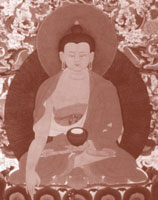|
of death, which will help to direct oneself towards the "three upper realms" This kind of goal is of the lowest standard for Dharma practice. The other kind of important goal for Dharma practice is to liberate oneself from the bondage of cyclic existence altogether, and thus will not be bound by the natural laws. Take for instance, in the practice of Vajrayana, if one can clearly visualize oneself as the illusory yidam at the moment of death, together with a good and solid foundation in Mind Training (Lojong), then one can use the force of the mind to liberate and free oneself from this natural law that governs the six realms of cyclic existence, and can directly go to the yidam's buddha-field. Yet, one must remember that if one lacks the foundation of Mind Training during this whole process, even though one can clearly visualize oneself as the yidam, one will fail in the escape from the bondage of samsara and eventually one will be drawn into the "three lower realms" The highest goal for Dharma practice is to attain complete enlightenment (Buddhahood), which is total freedom for oneself and the ultimate controller of one's own future and destiny. If the Dharma practitioner can achieve emptiness at the moment of death, one can be absorbed into the clear light of Dharmata and becomes the "enlightened one" (Buddha). Usually, things are more easily said than done. Those so-called "natural responses" are innate, inborn, unconscious and are embedded within each one of us for millions of years, and it is extremely difficult to root them out completely. It must need great determination, time, perseverance, and methods, together with other supporting conditions (such as the accumulations of lots of merits), in order that one can increase the probability of becoming more certain at the moment of death. It is just natural that how much one will reap will depend on how much one had already sown. The practice of the Dharma is like a long-lasting journey, the success of which will depend on one's determined will-power and the nurture of wisdom. Today's scientific discoveries are moving very rapidly, yet, from the Buddhist point of view, its search for the truth in human mystery is still walking on the same spot. Scientists have discovered that a large proportion of the human brain has not yet been fully utilized, and that each bodily cell, particularly each brain cell, contains various kinds of data. In this way, our human body is, in fact, a huge data bank storing billions of secret information, of which are the mysteries of evolutionary history in billions of years.
Yet, more than 2,500 years ago, the Lord Buddha had already shown us the truth that in the "mind" (the data bank) of each individual are kept all the "good and bad seeds" (data) that had been gathered ever since beginningless time. These "seeds" will follow one's "mind" wherever it goes, just like the shadow following the body, and will become the main cause in determining one's future "destiny" At the same time, these "seeds" will show themselves as the innate/inborn habitual tendencies and "natural responses" (of what we usually called as instincts in psychology) of the individual. In order to truly and totally handle one's own future and destiny, one must have to practice the Dharma, in order to minimize the effects of those "bad seeds" (through confessions, and so on) and to accumulate lots more of those "good seeds" so that one can push one's destiny towards the circuit of the "continuous circle of good deeds" In this way, one has a much better chance in allowing the "good seeds" to be brought out, while the "bad seeds" are to be suppressed. Thus, the corrections of the so-called "natural responses" (or instincts) within oneself is the most important direction of Dharma practice. In the long-lasting journey of Dharma practice, there are always opportunities for adverse conditions to appear. A lot of Dharma practitioners, because of not enough wisdom, could not comprehend all the circumstances and so they might end up falling off from the path. Usually, these people would have the doubt of "Why the buddhas and bodhisattvas have not blessed me, when I had already so diligently practiced the Dharma? Why did they allow me to be tortured by these -- CONTINUE -- |
|
| Introduction
of Other Publications | Other
Buddhist Websites | Official
Publication | Colour
Photos |
| Activities Section
| Introduction of
Association | Items
for order | Forms
| Email Us | Home
|
